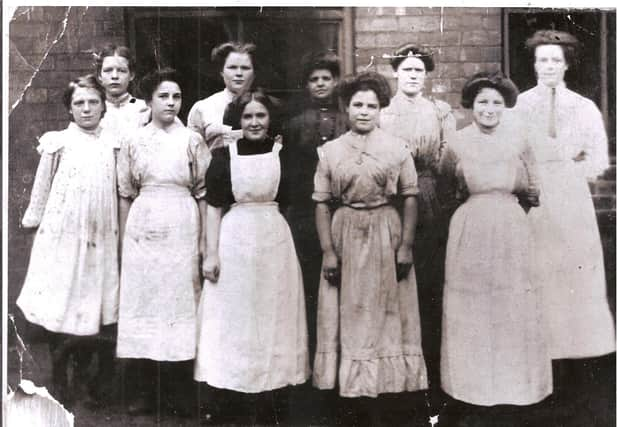Nostalgia with Margaret Watson: The first stick of rock was sold in Dewsbury – not Blackpool!


Margaret Watson writes: He came to Dewsbury from Leeds in 1848, looking for work and ended up building one of the largest steelworks in the country.
James was one of many young men, who during the Industrial Revolution, came to Dewsbury from various parts of the country hoping to make their mark.
They started from nothing and went on to build up prosperous businesses which became household names.
Another such young man was Ben Bullock, a coal miner from Burnley, who came in 1868 and started what became one of the largest confectionery businesses in Britain.
He started by selling sweets on market stalls in Dewsbury and Heckmondwike in the days when sweets were a luxury for the working classes.
He concentrated on the lower end of the market, selling only the cheaper varieties like butter drops and aniseed balls, and his business grew from there.
Ben eventually rented premises in Bradford Street, near to where the old Tudor Cinema used to be, and within a few years was employing 26 people and producing some five or six tons of sweets a week.
Today he is remembered as the man who produced Britain’s first stick of lettered rock, but these weren’t sold in Blackpool first, as many people have been led to believe.
The first stick was sold in Dewsbury, and the words printed through it were “Whoa Emma” – the title of a popular music hall song at the time.
The second batch did go to Blackpool in 1887 and from then on Bullocks began manufacturing lettered rock on a large scale, sending it not only to seaside towns throughout Britain but to towns and cities all over the world.
His business grew into one of such immense proportions that his factory in Bradford Street had to be continually extended to cope with increasing trade.
During the early 1880s he was making sweets such as butter drops, lemon drops and aniseed balls, and he only traded locally.
His output was about five or six tons of sweets a week, but by 1891 when he became a limited company under the title of B Bullock Ltd, all that was to change.
He got a big, new customer, a firm called Lever Bros, who had shops in Lancashire and Cheshire, and they started ordering tons of sweets a week. This was before Lever Bros became famous for their ‘Sunlight’ soap operations.
Bullocks were now progressing by leaps and bounds, employing upwards of 400 people and working round the clock to keep up with demand.
They were selling rock in almost every seaside resort, town and city in Great Britain and also in many countries throughout the world.
Sweets of all varieties were being exported from Dewsbury to places like Malta, Sierra Leone, Karachi, Baghdad, Australia , Lagos, Africa and America.
Good fortune seemed to follow this former coal miner every step of the way, ensuring that he was always in the right place at the right time.
The invention of non-porous paper solved the difficulty Ben had of obtaining a suitable wrapper for his very sticky product. It came at the right time and solved a major problem.
He was also attending an exhibition in Glasgow just at the right time to secure patent rights in an American patent vacuum sugar-boiling plant, which precluded the competition of other firms within a certain radius.
This improved method of sugar-boiling, combined with skilled organisation in their works, enabled Bullocks to commence mass production, something unheard of in those days.
Never afraid of taking risks he had struck while the iron was hot and managed to purchase a patent, which would completely revolutionise production at the Bullocks works in Dewsbury.
Before acquiring the patent, Bullocks had only been able to boil 40lbs of sugar in one pan, but now they were able to deal with five hundredweight in one go.
They were able to turn out immense quantities of sweets, enabling them to reduce their prices and bring them within the reach of the pockets of millions.
There was more success to come from this newly acquired patent which would allow Bullocks to produce sweets that could withstand the heat and humid conditions of many foreign countries.
This gave them the opportunity to cultivate a lucrative export trade, once again leaving their competitors far behind.
An employee of Bullocks, Mr Ben Jagger, of Thornhill Lees, recalled in an interview in the Reporter in 1932, that he had worked for 30 years for Bullocks, night and day during the winter months making lettered rock for the following summer seasons.
He also recalled that in 1888 when Mark Oldroyd MP was returned to Parliament, there were special ‘Mark Oldroyd” sticks of rock selling in the streets of Dewsbury within minutes of the result being announced.
Ben Bullock retired in 1898, and new people, Slade’s of Leeds, took over and the name was changed to Slade and Bullock Ltd.
A sequence of events, including a slump in trade and a large increase in the sugar tax, led to the firm closing down in 1928.
Hundreds of people were thrown out of work and many of them never found further employment in the trade.
Ben worked hard for many beneficent causes, gave liberally to the poor and worshipped at the old Centenery Wesleyan Church in Daisy Hill, and very generously supported its funds.
He was also a member of Dewsbury Town Council, representing All Saints Ward and later Trinity Ward.
Ben moved from his Dewsbury home in 1900 to live in Southport where he named his new house “Dewsburia’ after the town where he had made his fortune. He died there in 1905.
There is still a sweet being manufactured today bearing his name – “Poor Ben’s”. Few will realise where that name comes from but we in Dewsbury do!